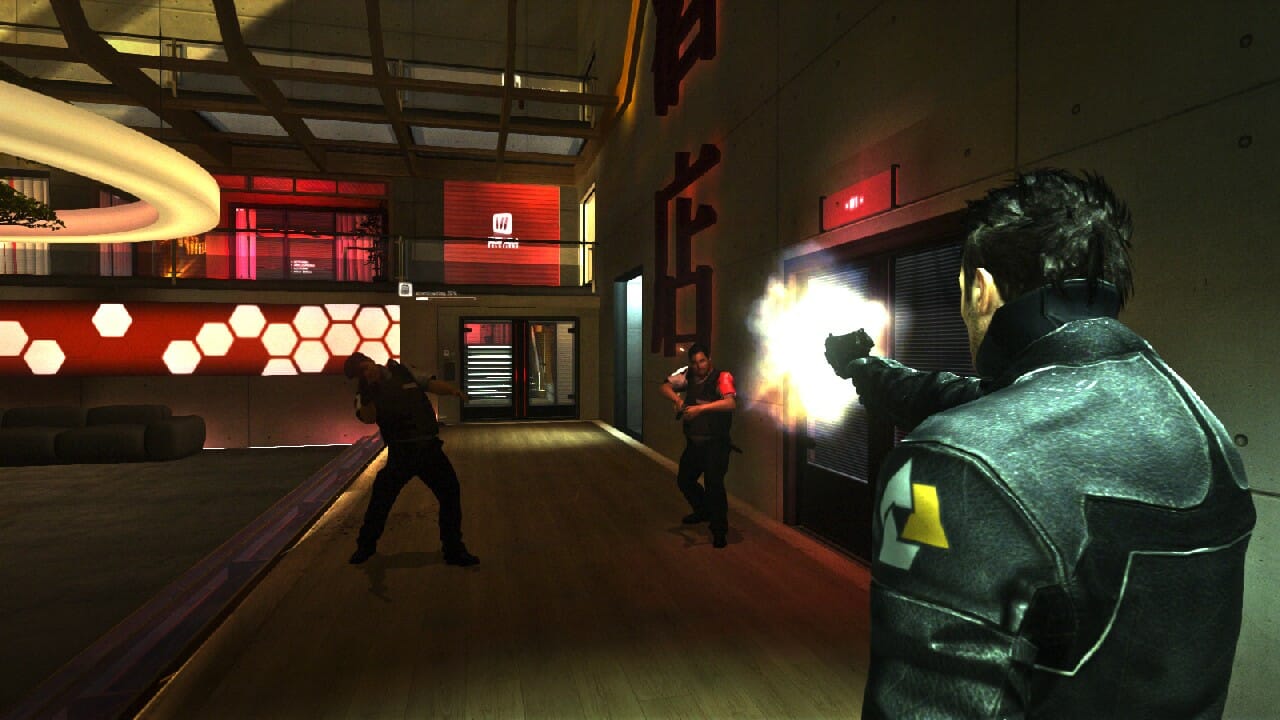Syndicate (Multi-Platform)

Sure, Bullfrog’s 1993 tactical masterpiece and Starbreeze’s 2012 first-person shooter reboot are both Syndicate games — in the same way that a Great Dane and a Pekingese are both dogs. Both bark and slobber and occasionally eat their own poop, but the similarities end there.
At a dog show, the judges don’t compare different breeds; each dog is evaluated against the ideal standards for its particular breed. Starbeeze’s reboot is a different animal than the original; comparisons are bound to fail. But even judged within the criteria of contemporary FPSes, the new Syndicate won’t take home any blue ribbons.
As in the original, the world of Starbreeze’s Syndicate is a dystopian future where human life is valued less than profit. Corporations dominate the globe, the outdated concept of nations having finally succumbed to the relentless pressures of privatization and greed. The divide between the haves and have-nots is extreme, with the 57 percent of humanity that’s been “chipped” — implanted with corporate-branded microcomputers that make most digital devices obsolete — living in corporate-sponsored comfort while the unchipped live in squalor in “downzones”. Technologically-enhanced Agents, ruthless cyber-James Bonds, conduct brutal acts of espionage to give their Syndicate an advantage over the others. As techno-dystopias go, it’s fairly standard fare, easily digestible by fans of Blade Runner, William Gibson, last summer’s Deus Ex: Human Revolution, or the last 30 years of science fiction.
You play as Miles Kilo, an Agent of EuroCorp who’s recently been upgraded to the prototype DART 6 chip. EuroCorp CEO Jack Denham (voiced by an appropriately mustache-twirling Brian Cox) sends Kilo and fellow Agent Jules Merit (the wonderfully-gravelly Michael Wincott) to kill a rival Syndicate’s scientist. In a thoroughly predictable sequence of events, Kilo learns shocking truths about: 1) EuroCorp scientist Lily Drawl (Rosario Dawson, doing her best Alyx Vance); 2) the obligatory anti-Syndicate resistance movement; 3) his own origins; and 4) the evil nature of the mega-corporation to whom he literally owes his life. The cast helps sell the characters to some extent, but not even starpower of that concentration can overcome the story’s oppressive sense of deja vu.

The gameplay is as easily digestible as the premise. While the shooting is better implemented and more satisfying than in such previous Starbreeze efforts as The Darkness and The Chronicles of Riddick: Escape From Butcher Bay, the level design contains little of the creativity of those games. There could have been interesting environmental storytelling opportunities here, since Kilo’s chip allows him to see “dataverse” overlays when he looks at certain objects; instead, focusing on a carton of orange juice reveals a text box confirming that it is, in fact, orange juice. While environments occasionally feature impressive vistas — there’s a particularly notable set-piece aboard a floating corporate fortress — they too often devolve into derivative corridor shooting. (The irritating light bloom effect obscuring everything on screen doesn’t help, either.) Kilo can activate a DART Overlay mode to see enemies behind cover, reduce damage, and plan attacks, a mechanic reminiscent of Detective Mode in Rocksteady’s Batman games. But contrary to Syndicate’s theme, the player is asked to mow down waves of enemies instead of actually acting like a spy.
That’s a particular shame given Syndicate’s one interesting mechanic, “breaching”. Thanks to his chip, Kilo can launch remote digital attacks on objects and enemies, assuming control over their chips like human malware. Breaching is accomplished by holding down a shoulder button while a meter fills, a simple but effective implementation that apes the “active reload” of the Gears of War series in style and the hacking abilities of Deus Ex: Human Revolution in function. Unfortunately, like the time-manipulation ability of 2010 shooter Singularity, breaching is a potentially fascinating mechanic that you’re not allowed to use very creatively. You can employ breaching like a long-distance “use” button to raise and lower cover, for example, or to hack a combat drone’s shields. More often, you’ll use breaching as a form of crowd control, instructing chipped enemy soldiers to off themselves with grenades or temporarily converting them into allies. It becomes, in other words, just another gun.
Breaching fares better in co-op, where teams of four agents complete a series of missions to earn persistent upgrades. Breaching an ally to heal him, for example, is just as satisfying as breaching a grenade to defuse it. You can customize your co-op Agent in an approximation of “classes,” although with more granularity than in typical class-based shooters. Syndicate succeeds much more in co-op play than in the campaign, largely because assembling a team of Agents with complementary skills and working together to complete objectives allows for more creativity in player action. Like the outstanding Exterminatus mode in last year’s Space Marine, co-op play in Syndicate rewards both cooperation and individual achievement. Still, I experienced significant stuttering and jerky animations in co-op on the Xbox 360, which dulled the experience somewhat. (No wonder I enjoyed healing my teammates, since I ended up shooting them more than the enemy.)